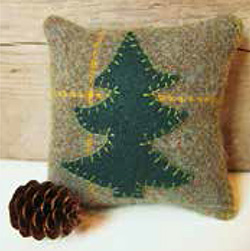 Relevancy and Engagement
newmexico.agclassroom.org
Relevancy and Engagement
newmexico.agclassroom.org

Value-Adding on a Christmas Tree Farm
In this activity, students will learn how to add value to Christmas trees by making scented pillows from balsam fir needles which can be used for gifts or potentially as a fundraiser for your classroom. Older students can also calculate the potential income from selling their value-added projects.
Time to Complete
1-2 hours (time will vary depending on sewing method)
Materials
- Balsam fir trees (post-Christmas discards) or cut branches (if doing this project at another time of year)
- Fabric (have students bring in recycled fabric from used clothing). They will need two 5”x 5” squares per pillow.
- Sewing machine (if you are going to sew the pillows) or needles and thread (if you are going to have students sew all or part of the pillows).
- Optional decorations for pillows (buttons, etc.)
Procedures
- Ask your students what they think is sold at a Christmas tree farm. Christmas trees! Yes, but often a whole lot more. It’s not easy making a living as a farmer, and farmers can earn more income by “adding value” to their Christmas trees. What might they make and sell? Many farms sell garlands and wreathes made from conifer boughs. Some sell scented pillows made from balsam fir, a deliciously fragrant conifer.
- Tell your students that they’re going to put the value-adding idea into action by making balsam fir sachet pillows. You can undertake this project with your students at any time of year, but it’s an especially good activity after Christmas—it’s a great way to use the needles of discarded Christmas trees.
- If you plan to do this project after Christmas, put the word out in your school community that you’d be interested in having 4 or 5 balsam fir Christmas trees brought to school and stored in a convenient place on the school grounds. If you’d like to do this project at a different time of year, gather balsam branches and let them dry out for a few weeks.
- Lay the trees or cut branches on a large tarp and have students help pull the needles from the branches. Have each student gather 1 to 1ó cups of needles—that will be enough to create a small pillow. If they are enthusiastic and you have plenty of trees, they can harvest more needles and make additional pillows as a classroom fundraiser. This is a nice way to practice the value-adding concept—start with your farm product (the Christmas tree) and make something beautiful and useful from it to generate additional income.
- To make the pillows truly recycled and maximize the value-adding, utilize recycled fabric for the pillow covers. Have your students bring in fabric from old shirts, blue jeans, etc. Each pillow will require two 5” x 5” squares (to create a finished pillow of about 4 inches.)
- Sew the two pieces of pillow fabric together, with right sides facing each other. You can sew the squares together with a sewing machine, if time is limited. Sew with a 5/8” seam, leaving a 2” opening on one side. Turn the pillow right side out and you’re ready to stuff. Or have the kids sew the pillows by hand.
- Use a piece of paper curled into a funnel shape to pour the needles into the pillow.
- Sew closed and decorate outside with buttons or other notions, if desired.
- Have students research on the Internet the going rate for balsam pillows. How many pillows would their class be able to create from a single Christmas tree? What additional value-added income could they generate through balsam pillow making, if they use all recycled materials to fabricate them?
Author
Christmas Tree Farmers Association of New York